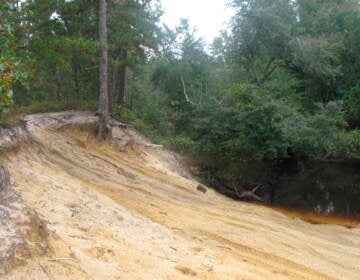Sweeney and Oroho promote economic development plan for Highlands, Pinelands
Taking page from urban enterprise-zone playbook, yet-to-be written legislation would cut sales taxes and offer property-tax relief

A wet meadow in Wharton State Forest, in New Jersey's Pinelands. (Emma Lee/WHYY, file)
This story originally appeared on NJ Spotlight.
Looking to boost economic development in the Pinelands and Highlands, Senate President Stephen Sweeney (D-Gloucester) joined with Sen. Steven Oroho (R-Sussex) in proposing a plan to expand the concept of urban enterprise zones to rural areas of the state.
The plan, being formulated under legislation yet to be written, envisions cutting the state sales tax within both preservation areas by more than 2%, and targeting a portion of the remaining revenue collected for reducing property taxes within the counties in those regions.
The proposal, unveiled at a press conference in Lafayette in Sussex County, aims to address what some view as a failure to compensate property owners for value their lands lost because of state efforts to preserve the 880,000 acres in the Highlands, in the northwest corner of the state, and 1 million acres of the Pinelands, in South Jersey.
“We have all supported efforts to grow the economies in our urban areas, but we need to grow the economies in all areas of the state and expand local economic opportunities for all New Jerseyans,’’ Sweeney said. “The rural areas deserve economic opportunities just like the urban areas.”
In the state’s urban enterprise zones, the sales tax is now 3.3125%, half of the rate elsewhere.
There has been debate over how effective those zones are in making local economies grow, with former Gov. Chris Christie, a Republican, allowing enterprise-zone designations to lapse in five communities during his second term, including Newark and Camden. Democratic Gov. Phil Murphy revived the program in all five areas early in his term.
Advocates said some rural areas have seen property values decline and house foreclosures rise, and maintain that establishing rural enterprise zones would grow the economy and still protect the environment.
“It has nothing to do with the (New Jersey) Highlands Council and its regulations,’’ said Oroho, who noted that jobs have declined since the implementation of the Highlands Act.
In addition to cutting the sales-tax rate, the proposal would also dedicate another 1% of the revenue collected in the zones to reducing property taxes in the respective counties in the Highlands and Pinelands regions.
Asked about the impact of the proposal on state finances, Sweeney said that New Jersey was currently exceeding projects on tax collections.
Mixed reaction
The proposal received mostly mixed responses from conservationists who have pushed for greater protections for the Highlands and Pinelands.
“As long as this doesn’t affect the Highlands Act, I think it’s a good idea,’’ said Elliot Ruga, policy director of the New Jersey Highlands Coalition, an organization dedicated to preservation in the region. “It was never intended for these towns to be ghost towns.’’
Carleton Montgomery, executive director of the Pinelands Preservation Alliance, noted the proposal doesn’t appear to change any of the Pinelands Commission’s development rules.
Nevertheless, he questioned whether the region needs to promote economic growth. “There is no evidence at all the region falls behind other areas of the state in economic growth,’’ Montgomery said.
Oroho said he is not sure when the bill will be introduced, but expects a tough battle to get it enacted into law, despite Sweeney’s support.
WHYY is your source for fact-based, in-depth journalism and information. As a nonprofit organization, we rely on financial support from readers like you. Please give today.



